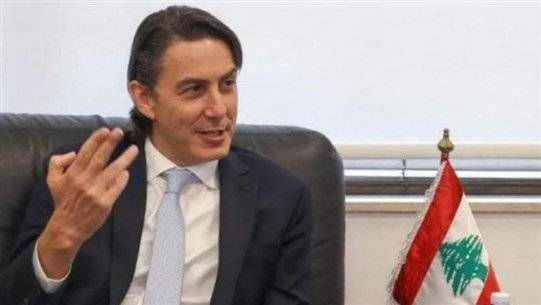The maritime demarcation file between Lebanon and Israel is swaying amidst the ebb and flow concerning the final lines of an agreement that has been dragging for over a decade, laden with technical, diplomatic, and political complications that extend to internal realities and external balances, as well as regional dynamics. In recent weeks, this file has entered a phase of uncertainty, with exchanges of boundary demarcation, deterrent equations, and direct military messages from Hezbollah or indirect ones through Israel’s transformation of Gaza into a “fire mailbox” for those concerned, while contradictory signals regarding the positives and negatives, optimism and pessimism have continued to flow, approaching a final Israeli response that the American mediator Amos Hochstein is expected to convey in a yes, no, or “maybe” format, presenting a new proposal that puts the ball back in Lebanon's court.
The demarcation issue cannot be approached without revisiting the beginning of the story, which started with the division of Beirut—when the file of oil exploration kicked off—with the Lebanese sea in the Mediterranean being divided into 10 oil blocks. The Ministry of Energy offered blocks 1, 2, 3, 5, 6, 7, 8, and 10 for bidding in the second licensing round in the maritime waters. The deadline for submitting participation requests for this round was set for September 15, 2022. Notably, blocks 4 and 9 were awarded in the first licensing round. Among the ten blocks, "block 9" and subsequently "block 8" are significant due to their location in a disputed border area with Israel, and they have become the center of international dealings and indirect negotiations between Lebanon and Israel under U.S. sponsorship.
Previously, the discussions primarily centered around "block 9" when the French company "Total" took on its exploration, which was halted after the COVID-19 outbreak. The Lebanese Cabinet then extended Total's operational deadline by three years in April, set to expire on May 21, 2025. Uncertainty continued to surround the exploration topic and Total's operations due to the difficult situation linked to the border demarcation and the mutual threats between Israel and Hezbollah. The focus shifted from block 9 to the Kana field, which is now a key to proposed solutions, as both Lebanon and Israel are preoccupied with block 8 and the amount of gas within it. Furthermore, the demarcation file and threats assumed a political dimension related to the potential dangers arising from reciprocal escalation.
In recent weeks, discussions have resurfaced concerning significant oil reservoirs in blocks 8 and 9, although no comprehensive technical surveys have been conducted by Lebanon. The renewed focus on these reservoirs coincided with fears that Israel might be trying to reclaim them after previously claiming "block 9" but facing complete Lebanese refusal. Total continues to remind that its operational area is far from the line of conflict and the tension zone. However, it has suspended its operations for reasons that exceed the conditions imposed by COVID-19 previously. Coinciding with Hochstein's recent visit about two weeks ago, there were discussions among official Lebanese circles about a more effective positive atmosphere than ever before.
Despite Hezbollah Secretary-General Hassan Nasrallah's escalating rhetoric since the drones were launched over the Israeli Karish field in early July, Lebanese impressions leaned towards confirming positive international and American sentiments regarding the demarcation and Israel's acceptance to grant the Kana field entirely to Lebanon, extending southward of line 23. Meanwhile, some in Beirut consider this field insufficient in itself without the other reservoirs, particularly the larger Kana western field located in "block 8." Lebanon's expectations were not built on actual operational realities regarding American guarantees but rather on several factors: first, Israel, facing internal crises, is not inclined to engage in military adventures with Hezbollah, especially following the threats issued. Second, France’s positive messaging about beginning exploration is not willing to endanger its company, much like Greece, which has revealed the Greek ownership of the production vessel "Energean Power" operating in Karish. Third, Lebanon deemed that the time pressures on Israel to supply Europe with gas—after the repercussions of the Ukraine war and the European power struggle with Russia—would not permit military tension that could undermine gas transfer projects.
Based on these factors, numerous positives emerged last week, following President Michel Aoun's comments about a near agreement in favor of Lebanon. However, following Hochstein's visit, the atmosphere reflected varying degrees of caution regarding the potential for the file to re-enter a bottleneck due to several considerations. Israel is preparing for early elections, and it is not in the interest of any party, including the current government, to enter into an agreement with Lebanon, as discussions in Tel Aviv indicated it would not be in their favor, suggesting the agreement should not only pertain to the Kana field, with hints at the possibility of subjecting any "maritime concession" from Lebanon to a public referendum. Notably, Israel had previously circulated similarly positive vibes last February, discussing an impending agreement with Beirut.
After reports surfaced about an Israeli inclination to postpone decisive negotiations until after the Knesset elections, a negative atmosphere ensued, with messages circulated by Hezbollah indicating that the party's warning does not solely relate to the demarcation or the Kana field but aims to prevent Israel from extracting gas from any field, starting with Karish, asserting that the "deadline" remains set for the upcoming September as long as Lebanon has not started extracting its gas and the agreement has not been finalized.
Given this equation, one can question who has drawn whom into the anticipated clash: Israel by implying acceptance of Lebanon's position regarding line 23 plus the entirety of Kana, or Hezbollah, which has broadened its equation beyond the demarcation related to the line and has outlined a new deterrent line concerning preventing Israel from extracting gas from any field. Despite the potential for international reactions, including from global companies, due to Israel’s exploration in non-disputed fields with Lebanon, the wait for a final answer from the American envoy continues, with deadlines tightening and Hezbollah’s atmosphere reflecting a seriousness of potential confrontation if Israel does not engage in negotiations for a settlement regarding line 23 and the Kana field in the upcoming days and expedite the exploration and extraction from Lebanese fields.




